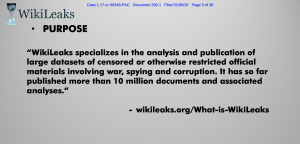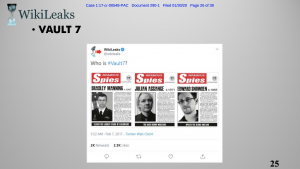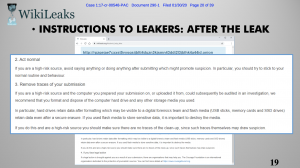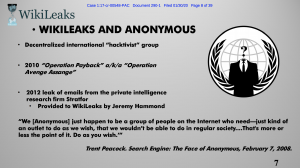Last June, I ran into some folks who remain very close to Julian Assange. One of them scheduled dinner with me solely to scold me for writing honestly about the things that WikiLeaks had done in the past three years rather than focusing exclusively on the EDVA Espionage indictment charging Assange for things he did almost a decade ago.
The person complained that my factual reporting on 2016 election and — especially — the Vault 7 leak (I think this was the offending post) would undercut whatever unanimity there was among journalists (unanimity that I joined) that the existing charges against Assange were a dangerous precedent for actual journalists. Reporting true details about shitty things Assange had done in recent years on my humble little blog, it was claimed, would dangerously and singlehandedly undercut Assange’s defense.
No, I did not much appreciate the irony of being criticized for accurate reporting by someone purportedly defending journalism.
But I also thought the concerted effort to suppress what Assange had done recently, while perhaps necessary to generate the statements of support from journalists that were forthcoming, was short-sighted, because it misrepresents what Assange is actually facing. The grand jury in EDVA remains (as far as we know) active. The government specifically said, in June, that it needed Chelsea Manning’s testimony for subjects or charges not yet charged and said such charges were not time barred (as would be true of any ongoing conspiracy).
As the government’s ex parte submissions reflect, Manning’s testimony remains relevant and essential to an ongoing investigation into charges or targets that are not included in the superseding indictment. See Gov’t’s Ex Parte Mem. (May 23, 2019). The offenses that remain under investigation are not time barred, see id., and the submission of the government’s extradition request in the Assange case does not preclude future charges based on those offenses, see Gov’t’s Supplement to Ex Parte Mem. (June 14, 2019).
Since then, Jeremy Hammond has joined Manning in believing he can wait out whatever EDVA has in store.
Most of all, Joshua Schulte’s prosecution for the Vault 7 leak — a leak almost no WikiLeaks supporters I know will offer an enthusiastic defense of — kept chugging along. In recent weeks, Schulte has submitted a number of questionable filings claiming the dog ate his homework so he can’t be prepared in time for his trial:
- The attorney appointed after defense attorneys said they needed one more attorney to prep for trial in time said he couldn’t prep for trial in time, but can’t talk about why not until he’s done with a week-long vacation
- The government’s (admittedly long) motion in limine repeating details the government disclosed several times before took the defense by surprise
- The defense can’t make a constitutional challenge to CIPA generally until the judge rules on CIPA specifically (this is the one arguably reasonable request)
- The defense had no idea the government wasn’t claiming Schulte downloaded a terabyte of data onto a thumb drive that can’t hold that terabyte even though the government told the defense that a year ago and then again in November
But as of now, Schulte’s trial is due to start on January 13, a month and a half before Assange’s first substantive extradition hearing starting on February 25.
And at that trial, the government is preparing to argue that Schulte intended to harm the United States when he leaked these files to WikiLeaks, a stronger level of mens rea than needed to prove guilt under the Espionage Act (normally the government aims to prove someone should have known it could cause harm, relying on their Non-Disclosure Agreements to establish that), and one the government has, in other places, described as the difference between being a leaker and a spy.
To make that argument, the government is preparing to situate Schulte’s leaks in the context of prior WikiLeaks releases, in a move that looks conspicuously like the kind of ongoing conspiracy indictment one might expect to come out of the WikiLeaks grand jury, one that builds off some aspects of the existing Assange indictment.
In a motion opposing Schulte’s effort to disqualify Paul Rosenzweig as an expert witness (see this post for background), the government lays out some of the things it plans to have Rosenzweig explain to the jury. Some of this is dangerous criminalization of security, most notably tying WikiLeaks’ endorsement of Tor and Tails to Schulte’s own use of it.
But some of it fleshes out the scope the government laid out when it first requested to call Rosenzweig.
The Government recognizes the need to avoid undue prejudice, and will therefore limit Mr. Rosenzweig’s testimony to prior WikiLeaks leaks that have a direct relationship with particular aspects of the conduct relevant to this case, for example by linking specific harms caused by WikiLeaks in the past to Schulte’s own statements of his intent to cause similar harms to the United States or conduct. Those leaks include (i) the 2010 disclosure of documents provided to WikiLeaks illegally by Chelsea Manning; (ii) the 2010 disclosure of U.S. diplomatic cables; (iii) the 2012 disclosure of files stolen from the intelligence firm Stratfor; and (iv) the 2016 disclosure of emails stolen from a server operated by the Democratic National Committee.
For example, it will tie WikiLeaks’ failure to redact the identities of US sources in Chelsea Manning’s leaks — something charged in counts 15 through 17 of Assange’s indictment — to Schulte’s behavior. It sounds like Rosenzweig will explain something I’ve alluded to: WikiLeaks apparently left the names of some of Schulte’s colleagues unredacted, which given WikiLeaks’ big show of redacting the files could only have been intentional and would have required coordination with Schulte to do.
Mr. Rosenzweig will testify that WikiLeaks does not typically redact the information that it publicly discloses (even when that information may reveal confidential sources). The Government will introduce evidence, however, that the Classified Information was purportedly redacted when posted online. Mr. Rosenzweig’s testimony will help the jury understand the significance of WikiLeaks’ unique claim to have redacted the Classified Information, including, for example, the period of delay between when Schulte disclosed the Classified Information to WikiLeaks (in or about the spring of 2016) and when WikiLeaks first announced that it would begin to disclose the Classified Information (in or about the spring of 2017). [my emphasis]
One reason Assange made a show of redacting the identities was because he was attempting to extort a pardon at the time, so he had to appear willing to negotiate with DOJ. But it seems likely Rosenzweig will explain that that was just a show and that even as WikiLeaks was making that show it was also ensuring that other CIA SysAdmins might be targeted by foreign governments.
Likewise, Rosenzweig will tie the embarrassment caused by Manning’s releases to Schulte’s own intent to cause damage with his self-described Information War against the US.
The Government intends to introduce evidence (including his statements) of Schulte’s knowledge of Manning’s leak and the need for the U.S. government to maintain secrecy over certain information. Furthermore, the Government also plans to introduce evidence of how Schulte, from the Metropolitan Correctional Center (the “MCC”), declared an “information war” against the United States, pursuant to which he intended to publicly disclose classified information and misinformation, including through WikiLeaks (such as the Fake FBI Document), for the purpose of destroying the United States’ “diplomatic relationships,” and encouraged other U.S. government employees to disclose confidential information to WikiLeaks. Mr. Rosenzweig will explain to the jury generally information other leakers have transmitted to WikiLeaks that the organization published and how foreign governments reacted negatively to WikiLeaks’ disclosure of that information—leading, for example, to the highly-publicized resignation of the U.S. Ambassador to Mexico.
Effectively, the government will argue that if you want to conduct an Information War on the US, you choose to leak to WikiLeaks and ensure it will be as damaging as possible. Whatever the circumstances of Manning’s leaks, this uses Schulte’s stated desire to damage the US to retroactively taint what WikiLeaks has claimed in the past was mere journalistic exposure of wrong-doing. That doesn’t necessarily change the First Amendment danger in charging Assange. But it surely attempts to undercut WikiLeaks’ brand as a journalistic entity.
Most interestingly, the government will point to a claim Schulte made to a journalist while writing from jail (one that is plausible given some of his past public postings, but if true, is an unfathomable indictment of CIA’s vetting process) that he once belonged to Anonymous. Rosenzweig will tie this to Anonymous’ decisions to leak the Stratfor cables to WikiLeaks in 2012.
As described in the Government Motions in Limine, in encrypted communications from one of the Contraband Cellphones, Schulte (posing as a third person) stated that he had previously been a member of Anonymous, a group of online hacker activists. Mr. Rosenzweig will testify about how, in 2012, Anonymous and WikiLeaks worked together to release information from a private U.S. intelligence firm.
Of course, Anonymous didn’t just leak the Stratfor cables to WikiLeaks. They also shared files stolen during the Arab Spring and the Syria files. The latter leak provides one of the earliest indicators where the process by which WikiLeaks obtained files may have involvement of Russia, because somehow a file that would have been very damning for Russia never got published. But both would make the story the US wants to tell more complex (though still potentially consistent).
In any case, the focus on Stratfor may explain why the government is holding Jeremy Hammond in contempt to try to get him to testify in the EDVA grand jury, particularly if the government has reason to believe that Schulte was part of that hack.
Finally, the government will use Rosenzweig to explain how, in the wake of the DNC leak and at a time he was in a huff at his CIA bosses again, Schulte did … something in August 2016.
The Government intends to introduce evidence that Schulte transmitted the Classified Information to WikiLeaks in the spring of 2016, that WikiLeaks did not begin to disclose the Classified Information until March 2017, that Schulte was angry with CIA management in August 2016 over a performance review he received, that Schulte’s protective order against Employee-1 was vacated in August 2016, and that, around that same time (i.e., in August 2016), Schulte began to conduct extensive research online about WikiLeaks. The Government intends to offer evidence relating to those searches, including the specific queries Schulte conducted. Schulte has argued in his writings that his August 2016 research was related to WikiLeaks’ August 2016 disclosure of information stolen from a Democratic National Committee server (the “DNC Leak”). Mr. Rosenzweig will testify about the DNC Leak, including the type of information that WikiLeaks actually disclosed in connection with that leak, which will demonstrate why Schulte’s WikiLeaksrelated searches include queries that had nothing to do with the DNC Leak
Side note: Part of the media blitz Assange did in the wake of the DNC leaks included a claim to Chuck Todd that if WikiLeaks ever received information from US intelligence, they would publish it.
Well, it’s a meta story. If you’re asking would we accept information from U.S. intelligence that we had verified to be completely accurate, and would we publish that, and would we protect our sources in U.S. intelligence, the answer is yes, of course we would.
No one else would have, but Schulte would presumably have recognized this as a nod to him, reassurance provided on heavily watched TV that WikiLeaks was progressing towards releasing the files Schulte had leaked. Which is why the likelihood that Schulte also stole a single file reflecting CIA collecting information on who might win the 2012 French presidential election, which WikiLeaks subsequently falsely portrayed as proof that CIA had infiltrated political parties in France rather than asked well-placed sources for readily available information, is of particular interest.
The government, however, is going to point to other Google searches by Schulte from August 2016 that lump Edward Snowden and Shadow Brokers in with WikiLeaks.
For example, in addition to searching for information about WikiLeaks and Julian Assange, its primary leader, Schulte also conducted searches using the search terms “narcissist snowden,” “wikileaks code,” “wikileaks 2017,” “shadow brokers,” and “shadow broker’s auction bitcoin.” “Snowden” was presumably a reference to Edward Snowden, the former NSA contractor who disclosed information about a purported NSA surveillance program, and “Shadow Brokers” was a reference to a group of hackers who disclosed online computer code that they purportedly obtained from the NSA, beginning in or about August 2016.
I have long wondered whether Vault 7 was not a free-standing leak but instead part of the Shadow Brokers operation. This seems to suggest the government knows they are. If that’s right, it would suggest that in the period when the government was trying to figure out precisely what Russia had done in 2016, both the NSA and CIA’s ability to spy on Russia (and other countries) would have been been deliberately burnt to the ground. And if Schulte knowingly participated in that — in an effort to ensure that the US would struggle to even learn what Russia had done in 2016 — it would explain why they’re planning on arguing he is more of a spy than a leaker.
Which would, in turn, explain why they took the first steps towards arresting Assange as FBI started putting together the evidence needed to charge Schulte on these leaks in 2017.
Let me be clear: I’m not saying I’m sure they’ll fill all these details in a superseding Assange indictment (though the government said it could not provide Assange the underlying evidence even for the 2010 charges until around Christmas — at which point Schulte will have gone through the CIPA process of declassifying classified information for use in his defense, and they could add charges at least until the February 25 hearing). It may still be that the government won’t want to get into the level of classified detail they’d need to to flesh out that case, particularly if they can’t coerce Manning and Hammond to cooperate.
I’m also not making a normative judgment that this eliminates the very real problems with the way Assange is charged now. Without seeing the government’s case, it’s too soon to tell.
What I’m trying to do is lay out what the government seems to be preparing to argue about WikiLeaks in the Schulte case. No doubt this will get me invited for another stern scolding at dinner, but it’s time to stop pretending Assange is being prosecuted for the understanding of WikiLeaks that existed in 2010. By all means, people can and will still defend Assange for taking on an imperialist America. For much of the world (though presumably not among any Five Eyes governments, including Assange’s home country), that still makes him an important dissident taking on a superpower. There is some merit to that stance, but it also requires arguing that superpowers shouldn’t have democratic elections.
But the government is preparing to argue that, after helping Russia tamper in America’s election, WikiLeaks deliberately burned some of CIA’s collection abilities to the ground, making it harder for the US to figure out how Russia did so. The government is preparing to argue that such actions are consistent with what WikiLeaks has been up to since 2010.
I’ve been expecting we might see an indictment alleging WikiLeaks and its associates were and remain engaged in an ongoing conspiracy (a possibility that, if Manning and Hammond’s lawyers haven’t warned them about, they are being utterly negligent, because the government could well argue that obstructing this investigation by refusing to provide immunized testimony is an overt act furthering the conspiracy).
The citations the government has used to justify Rosenzweig’s testimony are heavily focused on terrorism and mob cases (United States v. Farhane and United States v. Mustafa, which are al Qaeda cases; United States v. El Gammal, which is an ISIL one, and United States v. Rahimi, the self-radicalized Chelsea bomber; United States v. Lombardozzi and United States v. Locascio which are Gambino cases, United States v. Amuso, a Lucchese case), including one RICO case. That’s undoubtedly why Schulte’s lawyers really want Rosenzweig’s testimony excluded, to avoid having WikiLeaks treated like an organized crime syndicate.
But if the government is preparing to claim that WikiLeaks worked with Schulte not only to obtain files it tried to use to extort a pardon but then released them in a way that would hurt America’s efforts to respond to Russia’s 2016 operation, that’s a pretty compelling analogy.
Update: After comments from Stefania Maurizi, I’ve rephrased how I described what happened with the Syria Files. I want to be clear the statement in the post was not based on what I’ve been told by reliable sources about the process by which those files got shared with WikiLeaks.
As I disclosed last year, I provided information to the FBI on issues related to the Mueller investigation, so I’m going to include disclosure statements on Mueller investigation posts from here on out. I will include the disclosure whether or not the stuff I shared with the FBI pertains to the subject of the post.







